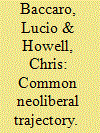|
|
|
Sort Order |
|
|
|
Items / Page
|
|
|
|
|
|
|
| Srl | Item |
| 1 |
ID:
109158


|
|
|
|
|
| Publication |
2011.
|
| Summary/Abstract |
Based on quantitative indicators for fifteen advanced countries between 1974 and 2005, and case studies of France, the United Kingdom, Germany, Italy, Sweden, and Ireland, this article analyzes the trajectory of institutional change in the industrial relations systems of advanced capitalist societies, with a focus on Western Europe. In contrast to current comparative political economy scholarship, which emphasizes the resilience of national institutions to common challenges and trends, it argues that despite a surface resilience of distinct national sets, all countries have been transformed in a neoliberal direction. Neoliberal transformation manifests itself not just as institutional deregulation but also as institutional conversion, as the functions associated with existing institutional forms change in a convergent direction. A key example is the institution of centralized bargaining, once the linchpin of an alternative, redistributive and egalitarian, model of negotiated capitalism, which has been reshaped in the past twenty years to fit the common imperative of liberalization.
|
|
|
|
|
|
|
|
|
|
|
|
|
|
|
|
| 2 |
ID:
088920


|
|
|
|
|
| Publication |
2009.
|
| Summary/Abstract |
Despite continued social protest, something quite fundamental has changed in the regulation of class relations in France. This article explores two paradoxes of this transformation. First, a dense network of institutions of social dialogue and worker representation has become implanted in French firms at the same time as trade union strength has declined. Second, the transformation has involved a relaxation of centralized labor market regulation on the part of the state, yet the French state remains a central actor in the reconstruction of the industrial relations system. Institutional reform of industrial relations could not take place without the active intervention of the state because employers and trade unions alone were unable to create durable industrial relations institutions. The collapse of trade unionism meant the need for new actors on the labor side and only the state could both create and confer legitimacy upon those new actors.
|
|
|
|
|
|
|
|
|
|
|
|
|
|
|
|
|
|
|
|
|